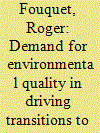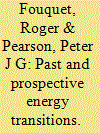|
|
|
Sort Order |
|
|
|
Items / Page
|
|
|
|
|
|
|
| Srl | Item |
| 1 |
ID:
116701


|
|
|
|
|
| Publication |
2012.
|
| Summary/Abstract |
The purpose of this paper is to understand the long run demand for energy-related environmental quality, its influence on legislation and on transitions to low polluting energy sources. It presents a series of episodes in British history where a demand for improvements in energy-related environmental quality existed. These episodes helped to identify a few cases where markets partially drove transitions to low polluting energy sources, in specific economic conditions. More generally, they showed that, when pushed, governments will introduce environmental legislation, although it tends to be weak and poorly enforced. In the case of air pollution, strong and binding legislation occurred roughly one hundred years later than was socially optimal. Based on this evidence, for a transition to a low carbon economy, governments will probably need to introduce focussed and binding legislation, and this cannot be expected without strong and sustained demand for climate stability. This demand will need to be spearheaded by pressure groups to introduce legislation, to enforce it and to avoid it being over-turned by future governments.
|
|
|
|
|
|
|
|
|
|
|
|
|
|
|
|
| 2 |
ID:
187610


|
|
|
|
|
| Summary/Abstract |
This paper investigates the trade-offs between progressivity and effectiveness for a carbon tax versus an ‘excessive consumption’ levy. To do this, we compare the distribution of consumer welfare impacts and environmental effectiveness of an air travel carbon tax and a frequent flyer levy. Results show that both policies have the potential to achieve substantial carbon mitigation with minimal impacts on consumer welfare. Nevertheless, compared with a carbon tax, a frequent flyer levy is more progressive and effective at reducing emissions – thus, there is no trade-off between progressivity and effectiveness by using an excessive consumption levy to mitigate air travel emissions. Furthermore, considering the pronounced growth in demand projected for air travel over the next 30 years, results show the frequent flyer levy will remain more progressive and effective over time. Although further research is needed to assess the trade-offs on the supply-side (e.g., protection of regular customers, dynamic efficiency) and related to implementation (e.g., data privacy, the role for revenue recycling), such an excessive consumption levy has the potential to be an equitable, effective and politically acceptable environmental policy for curbing carbon dioxide emissions. This is relevant not only for air travel but for other forms of consumption in which the affluent are responsible for a large share of demand and associated carbon emissions.
|
|
|
|
|
|
|
|
|
|
|
|
|
|
|
|
| 3 |
ID:
116688


|
|
|
|
|
| Publication |
2012.
|
| Summary/Abstract |
This introduction to the special issue on past and prospective energy transitions presents some insights from research into past energy transitions of relevance for a possible transition to a low carbon economy. It also provides a synthesis of insights generated during a workshop attended by many of the leading researchers on this topic at Cardiff University in April 2011. The final section introduces the articles in the special issue. It is hoped that the workshop and this issue will help to move forwards the integration of the exciting research on past energy transitions in ways that will also offer valuable insights into the challenges of prospective low carbon transitions.
|
|
|
|
|
|
|
|
|
|
|
|
|
|
|
|
| 4 |
ID:
099242


|
|
|
|
|
| Publication |
2010.
|
| Summary/Abstract |
This paper reviews past energy transitions by sector and service to identify features that may be useful for future transitions. Although often considered a single event, the transition from traditional energy sources to fossil fuels involved numerous services and sectors at different times between 1500 and 1920. The main economic drivers identified for energy transitions were the opportunities to produce cheaper or better energy services. The existence of a niche market willing to pay more for these characteristics enabled new energy sources and technologies to be refined gradually until they could compete with the incumbent energy source. Nevertheless, this implied that, on average, the whole innovation chain took more than 100 years and the diffusion phase nearly 50 years. In the same way, low-carbon energy sources and technologies offer an additional characteristic (i.e. low carbon impact), which might be able to develop gradually in a niche market until they can compete with fossil fuels. However, because of consumers' tendency to free-ride, a successful transition will need governments to provide protection of this niche market-possibly for decades. Based on past experiences, a complete transition to a low carbon economy is likely to be very slow.
|
|
|
|
|
|
|
|
|
|
|
|
|
|
|
|
| 5 |
ID:
116694


|
|
|
|
|
| Publication |
2012.
|
| Summary/Abstract |
The purpose of this paper is to estimate trends in income and price elasticities and to offer insights for the future growth in transport use, with particular emphasis on the impact of energy and technological transitions. The results indicate that income and price elasticities of passenger transport demand in the United Kingdom were very large (3.1 and -1.5, respectively) in the mid-nineteenth century, and declined since then. In 2010, long run income and price elasticity of aggregate land transport demand were estimated to be 0.8 and -0.6. These trends suggest that future elasticities related to transport demand in developed economies may decline very gradually and, in developing economies, where elasticities are often larger, they will probably decline more rapidly as the economies develop. Because of the declining trends in elasticities, future energy and technological transitions are not likely to generate the growth rates in energy consumption that occurred following transitions in the nineteenth century. Nevertheless, energy and technological transitions, such as the car and the airplane, appear to have delayed and probably will delay declining trends in income and price elasticity of aggregate transport demand.
|
|
|
|
|
|
|
|
|
|
|
|
|
|
|
|
|
|
|
|
|